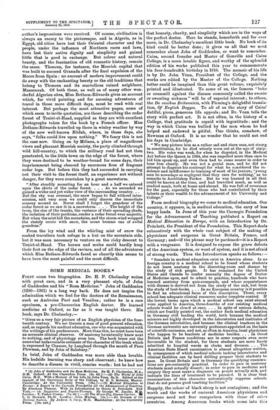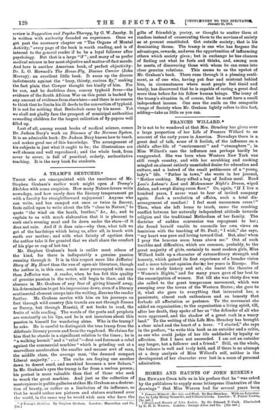SOME MEDICAL BOOKS.* FIRST come two biographies. Dr. H. P.
Cholmeley writes with great care, and in a very pleasant style, of John of Gaddesden and his "Rosa Medicinie." John of Gaddesden (1280-1361) is a long way back. He does not inspire the admiration which we feel for the doctors of the Renaissance, such as Ambroise Pare and Vesalius ; rather he is a rare specimen, a pre-Chaucerian English doctor. He learned medicine at Oxford, so far as it was taught there. His book, says Dr. Cholmeley,-
"Gives us a very fair picture of an English physician of the four- teenth century. We see therein a man of good general education, and, as regards his medical education, one who was acquainted with the writings of his predecessors. More than this, he must have been an accurate clinical observer. Of anatomy he naturally knew next to nothing, and of physiology even less. The book bears out the somewhat Unfavourable estimate of the character of the leech which is expressed by Chaucer, by Langland through the mouth of Piers Plowman, and by John of Salisbury."
In brief, John of Gaddesden was more able than lovable. His bedside learning was sharp and observant ; he knew bow to describe a disease in vivid, concise words : but be had not
• (I) John of Gaddesden and the Rosa Medicines. By H. P. Cholmeley, M.A., D.M. Oxford: At the Clarendon Press. Os. 6d.1—(2) The Works of John Caius, M.D. With a Memoir of his Life, by John Venn, Sc.D. Edited at the request of the Governing Body of the College, by E. S. Roberts, Master. Cambridge: At the University Press. [18s.]—(3) Medical Education in Europe: .A Report to the Carnegie Foundation for the Advancement of Teaching. By Abraham Flexner. With an Introduction by Henry S. Pritchett. New York.— -(4) Suggestion and Psycho-Therapy. By George W. Jacoby, M.& London T. Fisher Unwin. 17s. ga.]--(5) The House-Pty, Disease Carrier. L. 0. Howard, Ph.D. London : John Murray. [69.]-(6) Diseases of the Nerrous System. By Judson S. Bury, M.D. Manchester : At the University Preto. [15s. net.] that honesty, charity, and simplicity which are in the ways of the perfect doctor. Here he stands, henceforth and for ever more, in Dr. Cholmeley's excellent little book. No book of its kind could be better done ; it gives us all that we need remember about John of Gaddesden, or want to remember. Gains, second founder and Master of Gonville and Caius College, is a more lovable figure, and worthy of the splendid edition of his works published this year to commemorate his four-hundredth birthday in 1910. The memoir of his life is by Dr. John Venn, President of the College, and the works are edited by the Master of the College. Nothing better could be imagined than this great volume, exquisitely printed and illustrated. To some of us, the famous " boko or counseill against the disease commonly called the sweate or sweating sickness" will be of especial interest ; to others, the De canibus Britannicis, with Fleming's delightful transla- tion, Of English Dogges. To all of us the story of Caius' dutiful, pious, generous life appeals ; and Dr. Venn tells the story with perfect art. It is not often, in the history of a College, that gratitude is repaid with ingratitude : and the way in which Caius was bullied by the men whom he had helped and endowed is pitiful. One thinks, somehow, of Newman at Oxford. It is no wonder that he could not end his days in Cambridge.
" We may picture him as a rather sad and stern man, not strong in constitution, for he died utterly worn out at the age of sixty- two. His voice was weak, for when he disputed, in the Medical Act before the Queen in 1564, she was impelled more than once to bid him speak up, and even then had to come nearer in order to hear him clearly. He was not a genial man, and he did not attempt to disguise his contempt for what he considered the in- dolence and indifference to learning of most of his juniors; 'young men be nowadays so negligent that they care for nothing,' as he remarks to Archbishop Parker. But he was learned in all that could be known at the time, and had travelled much, as well as studied much, both at home and abroad. He was full of reverence for the past, especially for those who had contributed by their talents or their wealth to the advancement of his University and College."
From medical biography we come to medical education. Our country, it appears, is, in medical education, the envy of less happy lands. In June of this year the Carnegie Foundation for the Advancement of Teaching published a Report on Medical Education in Europe, with an Introduction by Dr. Pritchett, the President of the Foundation. This Report deals exhaustively with the whole vast subject of the making of physicians and surgeons in Great Britain, France, and Germany ; and—if the phrase may be pardoned—it is a Report with a vengeance. It is designed to expose the grave defects of the American system, or want of system, and it is not afraid of strong words. Thus the Introduction speaks as follows:-
" Scandals in medical education exist in America alone. In no foreign country is a medical school to be found whose students do not learn anatomy in the dissecting-room and disease by the study of sick people. It has remained for the United States and Canada to confer annually the degree of Doctor of Medicine upon, and to admit to practice, hundreds who have learned anatomy from quiz-compends, and whose acquaintance with disease is derived not from the study of the sick, but from the study of text-books. . . . In no European country is it possible to find an educational farce of this description. There, every school has adequate clinical resources under complete control. If the lowest terms upon which a medical school can exist abroad were applied to America, three-fourths of our existing medical schools would be closed at once. . . . In spite of serious defects, which are frankly pointed out, the author finds medical education in Germany still leading the world, both because the medical sciences are highly developed in the laboratories and institutes of the German universities, and because the clinical teachers in the German university are university professors appointed on the basis of scientific eminence, and not, as often in America, local physicians who happen to be teachers of medicine besides. . . . In Great Britain and France conditions are in some respects even more favourable to the student, for there students are more freely admitted to hospital wards as clerks and dressers. . . . The American State Board examination is almost altogether written, in consequence of which medical schools lacking laboratories and clinical facilities can by hard drilling prepare their students to pass. In Great Britain and in Germany the qualifying examina- tions are pre-eminently practical. In order to pass in anatomy students must actually dissect ; in order to pass in medicine and surgery they must make a diagnosis on people actually sick, and indicate the lines of treatment to be pursued. It is clear that examinations of this character automatically suppress schools that do not possess good teaching facilities."
Happily, the colour of black sheep is not contagious ; and the worth and the works of eminent American physicians and surgeons need not fear comparison with those of other countries. Among American books which come into this
review is Suggestion and Psycho-Therapy, by G. W. Jacoby. It is written with authority founded on experience. Once we get past the necessary chapter on "The Organs of Mental Activity," every page of the book is worth reading, and is of interest to the general reader if he be a loyal follower after psychology. But that is a large "if "; and many of us prefer medical science in her most objective and matter-of-fact moods. And here is another American book, of perfect objectivity : Dr. L. 0. Howard's The House-Fly, Disease Carrier (John Murray): an excellent little book. It sums up the diverse indictments against the " busy, thirsty, curious fly," making the fact plain that Cowper thought too kindly of him. For he can, and he doubtless does, convey typhoid fever—the evidence of the South African War on this point is backed by any amount of evidence from elsewhere—and there is no reason to think that he limits his ill deeds to the convection of typhoid. It is not for nothing that Beelzebub came by his name. Yet we shall not gladly face the prospect of municipal authorities rewarding children for the largest collection of fly-papers well filled up.
Last of all, among recent books of medical science, comes Dr. Judson Bury's work on Diseases of the Nervous System. It is an admirable book : Dr. Judson Bury knows how to teach, and makes good use of this knowledge. The arrangement of his subjects is just what it ought to be ; the illustrations are well chosen and well reproduced ; and the whole book, from cover to cover, is full of practical, orderly, authoritative teaching. It is the very book for students.



























































 Previous page
Previous page